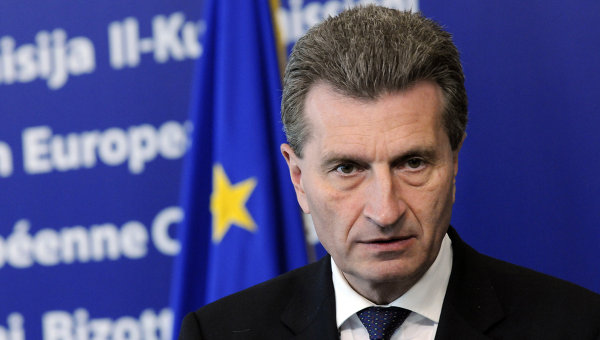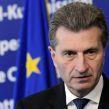
South Stream’s Credibility Problems Deepen After Brussels Promotional Event
Publication: Eurasia Daily Monitor Volume: 8 Issue: 107
By:

Russian Energy Minister, Sergei Shmatko, and Gazprom’s top hierarchy, along with their West-European business allies, advertised the South Stream project at a promotional event on May 25 in Brussels (Interfax, Euractiv, May 25, 26). The European Commission had agreed to be represented at this event, at Russian Prime Minister Vladimir Putin’s insistence, during the EU-Russia energy summit in February. The Russian side used the intervening months to prepare elaborate presentations of the project and deploy an unprecedented mass of lobbying power. It hoped through this all-out effort to demonstrate South Stream’s viability, neutralize legal objections to it within the European Union, and obtain EU financial backing for the South Stream project. Meanwhile, Putin and Shmatko had cast fresh doubts on this project by proposing a switch in the transportation mode, from pipeline to LNG, across the Black Sea.
South Stream CEO Marcel Kramer (recently recruited by Gazprom from Nederlands Gasunie) delivered the main presentation in Brussels, seconded by Miller and Shmatko. They declared that a new shareholders’ agreement for the pipeline on the seabed of the Black Sea would be completed during 2011; an overall technical and economic feasibility study, by September 2011; a final investment decision, by the end of 2012; aiming for the first gas volumes to flow in 2015, and full-capacity operation by 2018.
However, none of the presenters was able to identify sources for the putative 63 billion cubic meters (bcm) of gas per year, that Russia claims to be able to supply through this South Stream. Instead, Miller simply stated that Russia “has all the [gas] resources it needs” for this and other export projects. The presenters were similarly vague about financing South Stream. They urged the EU to confer priority status to this project within the Trans-European Networks (TEN) framework, which would facilitate access to European credits for South Stream. The project’s overall construction costs cost had been estimated at more than $20 billion by Gazprom. Furthermore, the Russian side seeks far-reaching exemptions from EU energy market legislation. Such exemptions are necessary if Gazprom were to build, co-own and operate South Stream’s pipeline branches on the territories of EU countries.
Except for gas, funding, and compatibility with EU law, this project holds all the other advantages, according to the presenters. Gazprom anticipates strong market demand in Europe and counts on the “experience and know-how” of its West-European partners in the South Stream consortium (Gazprom press release, May 25; Interfax, RIA Novosti, May 25, 26).
EU Energy Commissioner, Guenther Oettinger, sounded politely skeptical in his remarks. He had come to the event with an open mind for some answers: “Where would the gas actually come from? Where will it arrive? How will it arrive, by [LNG] ship or by pipeline? Will it divert gas from Ukraine?” From the commission’s standpoint, “South Stream so far seemed more of a concept than a concrete project” (Euractiv, May 26). Reflecting its virtuality, Miller countered that “it is more than a concept and more even than a project, it is an incipient construction” (Interfax, May 26).
Most questions from the commission and the press at the event were left unanswered or received vague answers from the Russian side. Oettinger reaffirmed that the EU “clearly has a preference” for its Southern Corridor, wants direct access with Caspian gas producers, and seeks a balanced trilateral solution for Ukraine’s gas transit system. Moreover, any South Stream pipelines (if built) in EU countries, would have to comply with the EU’s energy market legislation, including: competitive access for third-parties at non-discriminatory conditions, tariffs subject to regulation by the national regulators, and reverse flows (“Speech of Commissioner Oettinger at the South Stream event,” Brussels, May 25).
As Miller reported to President Dmitry Medvedev in Moscow after the Brussels event, Gazprom is in the process of recasting the South Stream consortium. Moscow offers to coopt Electricite de France and Wintershall as minority shareholders, and suggests that E.ON Ruhrgas would also be welcome. Any new entrant’s shares would be subtracted from that of Italian ENI, the original partner to Gazprom in South Stream from the project’s inception (Interfax, May 30).
That reorganization would apply to the pipeline’s section on the seabed of the Black Sea. The sections planned overland would be owned and operated by Gazprom with each host country on a bilateral basis. The Russian government and Gazprom propose to involve as many as seven EU member countries into this system. This poses a head-on challenge to the EU’s energy market legislation. This challenge, like South Stream itself, is a virtual one.
Russia is in no position to implement the project, but is interested in creating legal confusion and undermining EU legislation in putative South Stream participant countries. And it capitalizes on vested interests of its West-European business partners for political support toward that end.




